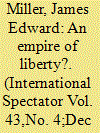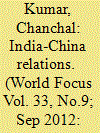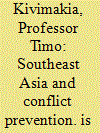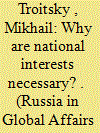|
|
|
Sort Order |
|
|
|
Items / Page
|
|
|
|
|
|
|
| Srl | Item |
| 1 |
ID:
084665


|
|
|
| 2 |
ID:
171398


|
|
|
|
|
| Summary/Abstract |
This paper reviews and updates the current renewable energy (RE) policy landscape in Lebanon. The focus is on opportunities for decentralised RE to not only address Lebanon's insufficient energy supply but the compounding challenges of mass displacement and changing climate. In recent years Lebanon has made great progress in RE despite the ongoing regional turbulence but more could be done to utilise the countries abundance of renewable resources, growing population and entrepreneurial acumen. Energy policy from a prosperity perspective is informed by the role public services play in people's self-defined aspirations of what it means to live a good life. With the policy support from above, locally managed and decentralised RE supply has potential to not only address the energy crisis but also mitigate the impacts of mass migration and climate change, setting Lebanon on a path to a sustainable and prosperous future.
|
|
|
|
|
|
|
|
|
|
|
|
|
|
|
|
| 3 |
ID:
172578


|
|
|
|
|
| Summary/Abstract |
This article analyses the patterns of poverty, prosperity, and rural transformation in Tanzania through longitudinal research examining livelihoods and asset change in a 20-year period. We argue that some current measures of rural transformation are inadequate for capturing forms of change that matter to rural Africans. We consider in detail some of the processes that lie behind such change in selected locations in Morogoro region, noting the importance of improvements that are taking place through smallholder agriculture. In conclusion, the article discusses the implications of these findings for agricultural policy while also cautioning about the blindness of our methods to other forms of poverty.
|
|
|
|
|
|
|
|
|
|
|
|
|
|
|
|
| 4 |
ID:
116215


|
|
|
| 5 |
ID:
148341


|
|
|
|
|
| Summary/Abstract |
Peace and Prosperity in a Vulnerable yet Beautiful World (On the 40th Anniversary of Philippines-Russia Diplomatic Relations)
|
|
|
|
|
|
|
|
|
|
|
|
|
|
|
|
| 6 |
ID:
134366


|
|
|
|
|
| Summary/Abstract |
The current model of economic growth generated unprecedented increases in human wealth and prosperity during the 19th and 20th centuries. The main mechanisms have been the rapid pace of technological and social innovation, human capital accumulation, and the conversion of resources and natural capital into more valuable forms of produced capital. However, there is evidence emerging that this model may be approaching environmental limits and planetary boundaries, and that the conversion of natural capital needs to slow down rapidly and then be reversed. Some commentators have asserted that in order for this to occur, we will need to stop growing altogether and, instead, seek prosperity without growth. Others argue that environmental concerns are low-priority luxuries to be contemplated once global growth has properly returned to levels observed prior to the 2008 financial crisis. A third group argues that there is no trade-off, and, instead, promotes green growth: the (politically appealing) idea is that we can simultaneously grow and address our environmental problems. This paper provides a critical perspective on this debate and suggests that a substantial research agenda is required to come to grips with these challenges. One place to start is with the relevant metrics: measures of per-capita wealth, and, eventually, quantitative measures of prosperity, alongside a dashboard of other sustainability indicators. A public and political focus on wealth (a stock), and its annual changes, could realistically complement the current focus on market-based gross output as measured by GDP (a flow). This could have important policy implications, but deeper changes to governance and business models will be required.
|
|
|
|
|
|
|
|
|
|
|
|
|
|
|
|
| 7 |
ID:
114814


|
|
|
|
|
| Publication |
2012.
|
| Summary/Abstract |
If the assessment of ASEAN's success in the past is difficult, speculations on whether ASEAN will be a success will be close to impossibility. Yet this is what is intended in this article. However, this is done by first defining robust criteria of success of conflict prevention. Conflict prevention is successful if conflicts and battle deaths can be avoided, either by means of conflict resolution or transformation, or simply by means of conflict avoidance. By starting with this criterion the article will argue that ASEAN peacefulness cannot be explained by durable objective conditions. Instead, it is built on imagined realities. The imagined realities of the ASEAN Way are getting more difficult to sustain due to their interaction with material and normative/institutional developments. Many of the constructed foundations of the ASEAN Way are unsustainable in the new realities where communication has become easy and uncontrollable, and societies have become wealthier and more democratized. However, the article will show that evidence of existing conflict violence suggests that ASEAN has started to reformulate its approach to conflict prevention and that this has largely been successful.
|
|
|
|
|
|
|
|
|
|
|
|
|
|
|
|
| 8 |
ID:
140147


|
|
|
|
|
| Summary/Abstract |
International relations are concerned with national interests and how they evolve. Some researchers insist that there are obligatory and unchangeable interests expressed in terms of power or prosperity. Others suggest reconstructing national interests depending on how a country acts in a particular situation. Still others hold that national interests are relatively stable, but can vary considerably due to external factors, such as emerging or disappearing norms, institutions, or circumstances.
|
|
|
|
|
|
|
|
|
|
|
|
|
|
|
|
|
|
|
|
|